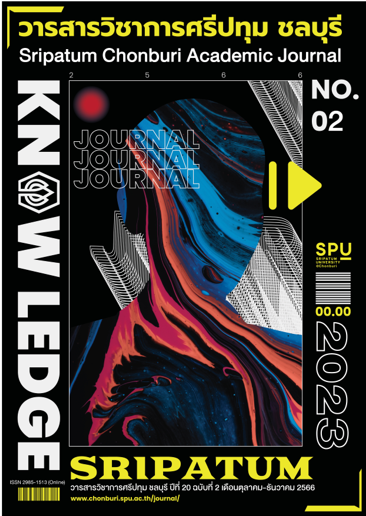A BUSINESS MODEL FOR DEVELOPING MEDICAL TOURISM ORGANIZATIONS IN THAILAND
Keywords:
Business Model, Industrial Medical TourismAbstract
This article was aimed at studying approaches for developing a business model of medical tourism organizations in Thailand, a case study of industrial medical tourism: hotel hospital and travel agent. The researcher reviewed the literature influencing the new business model development in organizations in Thailand and found 6 factors affecting the organization including: 1) Antifragile Business Model, 2) Robust Business Model, 3) Digital Business Model, 4) Adaptive Business Model, 5) Aided Business Model, and 6) Innovative Business Model. The core of the six factors above was the business model supposed to be innovation applying rapidly developed technology, having new methods of operation that have never been implemented before, or being pioneering organizations that dared to think and act within the industry and integrated the core values of the organization to increase the potential of generating income, increasing sales, attracting customers, and attracting investors in the future.
References
ไทยพาณิชย์. (2565). 6 เหตุผลส่ง “ไทย” ให้ปังในอุตสาหกรรม Medical Tourism (ออนไลน์). เข้าถึงได้จาก: https://www.scb.co.th/th/personal-
banking/stories/business-maker/6-reasons-thailand-the-best-in-medical-tourism.html [2566, 12 มิถุนายน].
ทีทีบี. (2565). ttb analytics คาดอุตสาหกรรมการท่องเที่ยวเชิงการแพทย์ของไทยฟื้นเร็วโตเฉียด 2.5 หมื่นล้าน บาทในปี 2566 (ออนไลน์). เข้าถึงได้จาก:
https://www.ttbbank.com/th/newsroom/detail/medical-tourism-2566 [2566, 10 มิถุนายน].
พุทธชาด ลุนคา. (2565). แนวโน้มธุรกิจ/อุตสาหกรรม ปี 2562-2564: ธุรกิจโรงแรม (ออนไลน์). เข้าถึงได้จาก:
https://www.krungsri.com/th/research/industry/industry-outlook/services/hotels/io/hotel-2022-2024 [2566, 9 มิถุนายน].
สุปราณี วรรณรุณ. (2565). รูปแบบการจัดการแนวใหม่ที่ส่งผลต่อการพัฒนาองค์กรในประเทศไทยในยุค New Normal. วารสารวิชาการศรีปทุม ชลบุรี, 18(3),
หน้า 181-192.
สุปราณี วรรณรุณ และภัทศา ภารัตนวงศ์. (2556). รูปแบบการจัดการแนวใหม่ที่มีความสัมพันธ์ต่อการพัฒนาองค์กรในประเทศไทยในยุค NEW NORMAL.
วารสารวิชาการศรีปทุม ชลบุรี, 19(2), หน้า 35-48.
สถาบันทรัพย์สินทางปัญญาแห่งจุฬาลงกรณ์มหาวิทยาลัย. (2560). รายงานการวิเคราะห์แนวโน้มเทคโนโลยีและอุตสาหกรรม อุตสาหกรรมการท่องเที่ยว
กลุ่มรายได้ดี และท่องเที่ยวเชิงสุขภาพ (ออนไลน์). เข้าถึงได้จาก:
https://www.ipthailand.go.th/images/3534/web_01052018/Report_CHU/8_Well-being_06.12.2017_CHU.pdf. [2566, 8 มิถุนายน].
สำนักประสานและบริหารโครงการ. (2565). การส่งเสริมคลัสเตอร์ท่องเที่ยวเชิงการแพทย์เพื่อเป็นศูนย์กลางการท่องเที่ยวของเอเชีย(ระยะที่ 2) (ออนไลน์).
เข้าถึงได้จาก: https://www.sme.go.th/upload/mod_download/18.บทความ1-ท่องเที่ยวเชิงการแพทย์2 (ปบ.).pdf [2566, 10 มิถุนายน].
Chen, Y., & Biswas, M. I. (2021). Turning crisis into opportunities: how a firm can enrich its business operations using artificial
intelligence and big data during COVID-19. Sustainability, 13(22), 12656. pp. 1-17.
Corvello, V., Verteramo, S., & Giglio, C. (2023), "Turning crises into opportunities in the service sector: how to build antifragility in small
and medium service enterprises". The TQM Journal, 35(5), pp. 1211-1223.
Indeed. (2022). 51 Innovative Business Models To Consider (Plus Benefits) (Online). Available: https://www.indeed.com/career-
advice/starting-new-job/innovative-business-models [2023, June 12].
Ivanov, D. (2021). Digital supply chain management and technology to enhance resilience by building and using end-to-end visibility
during the COVID-19 pandemic. IEEE Transactions on Engineering Management.
Lanzolla, G., Lorenz, A., Miron-Spektor, E., Schilling, M., Solinas, G., & Tucci, C. L. (2020). Digital transformation: What is new if anything?
Emerging patterns and management research. Academy of Management Discoveries, 6(3), pp. 341-350.
Munoz, A., Todres, M., & Rook, L. (2021). Empowering organisations to gain from uncertainty: a conceptualisation of antifragility
through leveraging organisational routines in uncertain environments. Australasian accounting, business and finance journal,
(3), pp. 23-42.
Ritter, T., & Pedersen, C. L. (2020). Analyzing the impact of the coronavirus crisis on business models. Industrial Marketing
Management, 88, pp. 214-224.
Rosenstock, T. S., Lubberink, R., Gondwe, S., Manyise, T., & Dentoni, D. (2020). Inclusive and adaptive business models for climate-
smart value creation. Current Opinion in Environmental Sustainability, 42, pp. 76-81.
Trischler, M. F. G., & Li-Ying, J. (2023). Digital business model innovation: toward construct clarity and future research directions.
Review of Managerial Science, 17(1), pp. 3-32.
Downloads
Published
Issue
Section
License
Copyright (c) 2023 Sripatum Chonburi Academic Journal

This work is licensed under a Creative Commons Attribution-NonCommercial-NoDerivatives 4.0 International License.
บทความทุกบทความเป็นลิขสิทธิ์ของวารสารวิชาการศรีปทุม ชลบุรี



